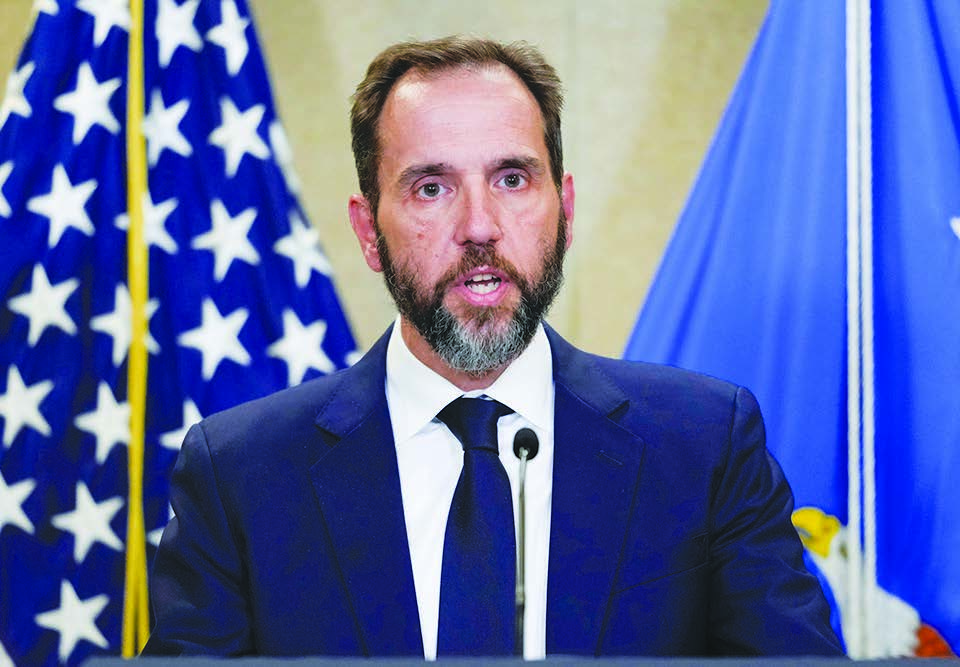
Special counsel Jack Smith speaks to the media Aug. 1, 2023, about an indictment of former President Donald Trump at the Department of Justice in Washington. On Monday, with Trump set to retake the presidency, Smith notified federal courts in Washington and Florida that the Justice Department would be dropping its two cases against Trump.
WASHINGTON — The U.S. Justice Department has moved to end its pursuit of criminal charges against Donald Trump, signaling a conclusion to the extraordinary federal prosecution of a former president whose reelection ensured he’d be shielded from charges while serving in the White House.
Special counsel Jack Smith, who charged Trump with illegally conspiring to obstruct the 2020 election and with mishandling sensitive national security information after he left office, filed papers in court Monday indicating the department would no longer move forward with either case against the president-elect.
The special counsel’s office is seeking to dismiss the election obstruction indictment against Trump in Washington in its entirety. In the classified records case, prosecutors said they won’t pursue an appeal to revive charges against Trump, but will press ahead with a challenge to a Florida federal judge’s dismissal of charges against his two co-defendants. The judge ruled earlier this year that Smith’s appointment was unconstitutional and tossed out the case.
Justice Department policy bars the prosecution of sitting presidents, forcing Smith’s hand to unwind the cases against Trump after he won the election. Trump, who denied wrongdoing, said he would fire Smith and order the department to close the special counsel’s work if he won a second term.
Smith wrote that his office “stands fully behind” the merits of the election obstruction case but the department’s prohibition on charging and prosecuting sitting presidents was “categorical.” The department asked the judge to dismiss the case “without prejudice,” leaving open the possibility that the prosecution effort could be revived once Trump leaves office.
Ending the case “does not turn on the gravity of the crimes charged, the strength of the government’s proof, or the merits of the prosecution,” he wrote.
Smith is expected to resign as special counsel before Trump is sworn in. It wasn’t immediately clear which Justice Department office would take over the Florida prosecution, but once Trump is in the White House he could order prosecutors to fully drop the appeal or to pardon the co-defendants, Waltine “Walt” Nauta and Carlos De Oliveira.
Trump’s latest pick to lead the Justice Department, former Florida Attorney General Pam Bondi, was one of the attorneys that signed a friend-of-court brief backing Trump’s position on appeal that Smith’s appointment was unconstitutional.
Neither federal case against Trump came close to a trial. The notices Monday represented a vindication of the legal strategy pursued by Trump’s lawyers, who pushed for delays and later hearing dates at every turn as the clock ticked down to Election Day.
Trump spokesperson Steven Cheung said in a statement that the special counsel’s decision was “a major victory for the rule of law.”
Historic indictments
Trump was the first former president indicted on felony charges. He also faced two state prosecutions, and the fate of those cases remains unsettled as he prepares to return to Washington.
A New York jury found Trump guilty of falsifying business records to cover up hush money payments to a former adult film star who claimed to have had a sexual relationship with him. A judge has delayed sentencing in that case as he decides how to proceed.
In Georgia, prosecution of Trump for his efforts to overturn the 2020 election have been on hold amid controversy about the lead prosecutor’s personal conduct.
State prosecutors aren’t bound by the same rules as the Justice Department.

